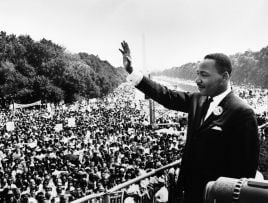Selma is a film that has been praised as “heartbreaking” and “inspiring”; the story of Martin Luther King’s leadership of the Selma to Montgomery marches, poignantly expressed under the backdrop of unrest in Ferguson. But is this really a film that champions the black struggle in the United States?
Once past the swooning and liberal white guilt of the Hollywood establishment, Selma needs to be understood for what it is: a commodity, funded with inordinate sums of money and glitzed over with all the requisite Hollywood glamour.
The entire form and structure of the film is unchallenging, constructed merely to provide entertainment and gloss over the political significance of its historical struggle. Selma is no revolutionary work of art.
“If the most militant person in the movie is played by Oprah, you know something is very, very wrong”, says Prof. Abdul Alkalimat of the University of Illinois. Oprah Winfrey is the figurehead of a conservative black political world-view – a billionaire whose work as a producer on the film is felt throughout.
MLK is presented as increasingly reluctant to pursue mass movement and social transformation, instead desiring more ‘political power’. Presumably this means that the election of Obama as president concludes MLK’s struggle? The black population in the U.S are still economically ghettoised and brutalised by the state, as we saw with the recent Ferguson riots that coincided with the film’s release. The death toll of this savage victimisation continues to rise.
MLK was not the conservative figure in history that the film depicts. His mission of social transformation is clear among his many speeches. MLK said that “a riot is the language of the unheard”, yet none of that anger is felt in Selma, with its constant barrage of propaganda justifying only non-violent means of change through, frankly, poorly written and forced dialogue.
MLK said “…one day we must ask the question, Why are there forty million poor people in America? And when you begin to ask that question, you are raising questions about the economic system, about a broader distribution of wealth. When you ask that question, you begin to question the capitalistic economy.” In this film Hollywood whitewashes the revolutionary content of MLK and the Black Civil Rights struggle.
It is typical that protests planned over the lack of diversity at the Oscars were cancelled at the request of Selma‘s director. The film is not remotely intended to challenge. Capitalism permeates throughout as it manages to turn untold suffering and struggle into Hollywood suffering and struggle.
It is darkly comical that the film couldn’t use the incredible speeches of MLK due to their licensing to another big-money Spielberg project, and I think this reveals the core point: for film to be progressive it must challenge and break down the conventions codified in capitalist film. Selma, unfortunately, does nothing to achieve this.






